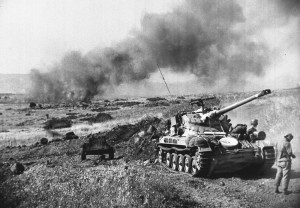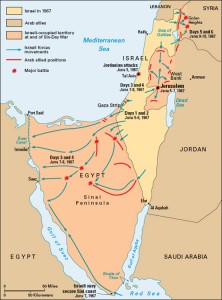6 Days and 50 Years
Tuesday, June 6th, 2017June 6, 2017
Fifty years ago this week, Israel and the Arab countries of Egypt, Jordan, and Syria fought a brutal war that lasted just six days. From June 5 to June 10, 1967, Israel defeated the combined forces of the other nations and preserved the young nation’s existence. The Six-Day War, also known as the June War or the Arab-Israeli War of 1967, was a crucial moment in the history of the Middle East. Far from settling rival national and religious issues, the war created further divisions between the region’s people and led to later conflict and tensions that continue today, 50 years after the last shot was fired.

The Arab-Israeli conflict erupted into war in June 1967. Israeli tanks, shown here, along with other Israeli air and ground forces, defeated the forces of Egypt, Syria, and Jordan. Credit: AP Photo
Israel and the region’s surrounding Arab nations have been at odds—and often in open conflict—ever since Israel was established in 1948. In 1967, tensions and border skirmishes in Syria, Israel’s neighbor to the northeast, led to an air battle between Israeli and Syrian warplanes. Egypt, pledging support for Syria, sent thousands of troops into the Sinai Peninsula southwest of Israel. Egypt also cut off the important Israeli port of Elat from the Red Sea. Syrian troops then massed on the Israeli border, and Jordan (southeast of Israel) joined the Egyptian-Syrian alliance. Arab leaders—most notably Egyptian President Gamal Abdel Nasser—called for Israel’s destruction. Some 330,000 Arab troops surrounded Israel, along with about 2,000 tanks and 600 warplanes. Israel’s forces included about 250,000 troops, 1,000 tanks, and 250 warplanes. The Israelis were outnumbered, but they were better equipped, trained, and coordinated. After failed diplomatic efforts, Israel struck before the Arab forces could attack.
Early on June 5, 1967, Israeli warplanes struck several Egyptian air bases. The attack destroyed hundreds of Egyptian planes. At the same time, Israeli tanks and infantry smashed into Gaza and the Sinai, routing Egyptian ground forces. By June 7, Israel had taken the Sinai.

Click to view larger image
In the 1967 Six-Day War, Israel faced the combined armies of Egypt, Jordan, and Syria. The fighting took place from June 5 to June 10 and ended in a decisive Israeli victory. Credit: WORLD BOOK map
Late in the morning on June 5, Jordanian artillery and warplanes struck positions in northern Israel, including Tel Aviv and west Jerusalem. Israel responded with air strikes that wiped out the Jordanian air force. That afternoon, Israeli troops began battling Jordanian forces in and around Jerusalem. Israeli warplanes destroyed Jordan’s reinforcement convoys. By the morning of June 7, only pockets of Jordanian troops remained in Jerusalem. Israeli forces then entered and gained control of Jerusalem’s walled Old City. By nightfall on June 7, Israel had taken the West Bank.
Syrian artillery and warplanes attacked Israeli targets along the Syrian border on June 5. Later that day, Israeli warplanes destroyed most of the Syrian air force. After fighting in the Sinai and the West Bank ended, Israel turned its attention to Syria’s heavily defended Golan Heights. Early on June 9, Israeli warplanes battered Syrian troops entrenched on the heights. By noon, Israeli ground forces had entered Syria. Fierce battles erupted all along the border, but Israeli troops soon controlled the Golan Heights. A cease-fire on June 10 ended the Six-Day War.
About 800 Israelis died in the Six-Day War, and another 2,400 were wounded. Combined Arab casualties (people killed, wounded, missing, or captured) were about 50,000, including more than 14,000 dead.
In November 1967, the United Nations called for Israel to withdraw from territories it gained in the war. In return, the Arab countries were to recognize and accept the nation of Israel’s right to exist. Israel, however, refused to give up the captured territories, and the Arab countries renewed their opposition to Israel.
Egypt and Syria again attacked Israel in the 1973 Yom Kippur War (also called the Ramadan War, the October War, or the Arab-Israeli War of 1973). This larger conflict ended in a stalemate. The Sinai Peninsula was returned to Egypt in 1979. Israel withdrew from the Gaza Strip in 2005 but maintains control of its borders. Israel still occupies the Golan Heights and parts of the West Bank.




